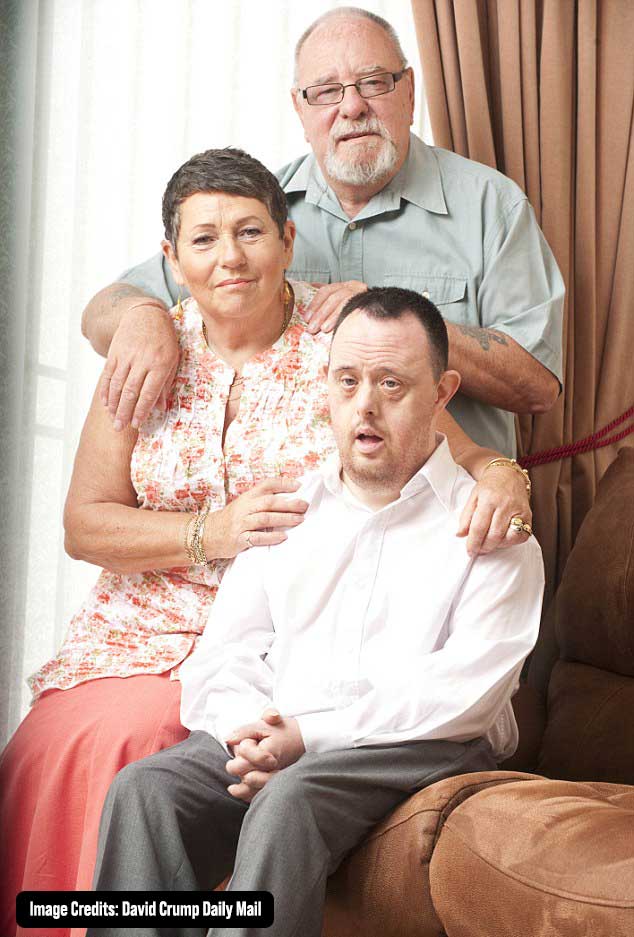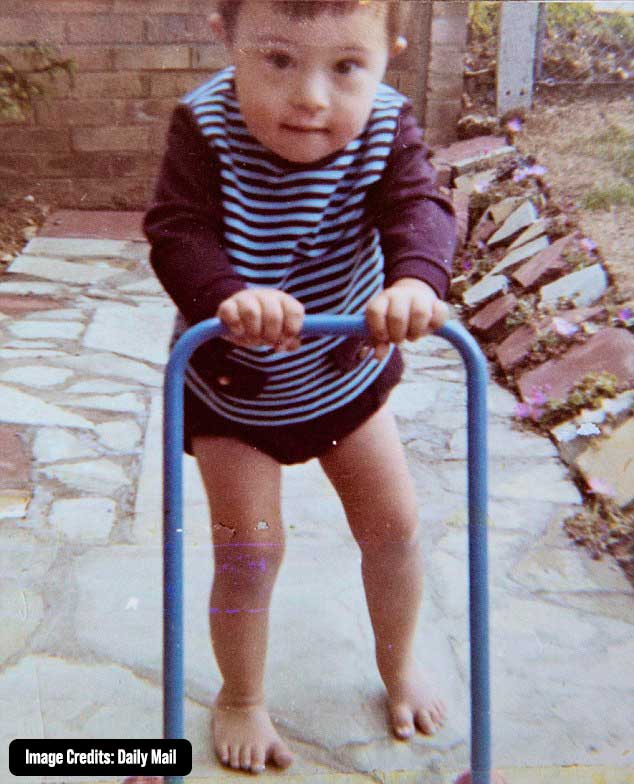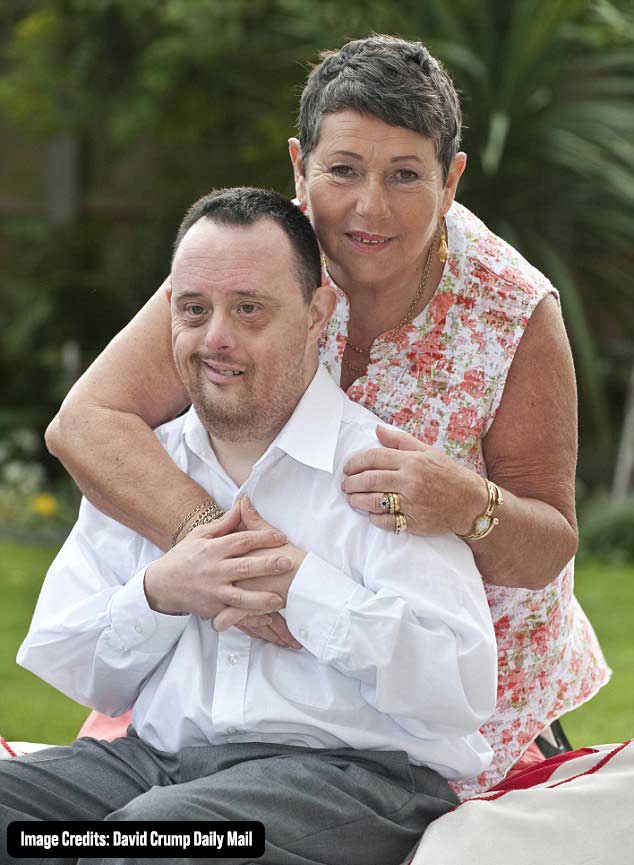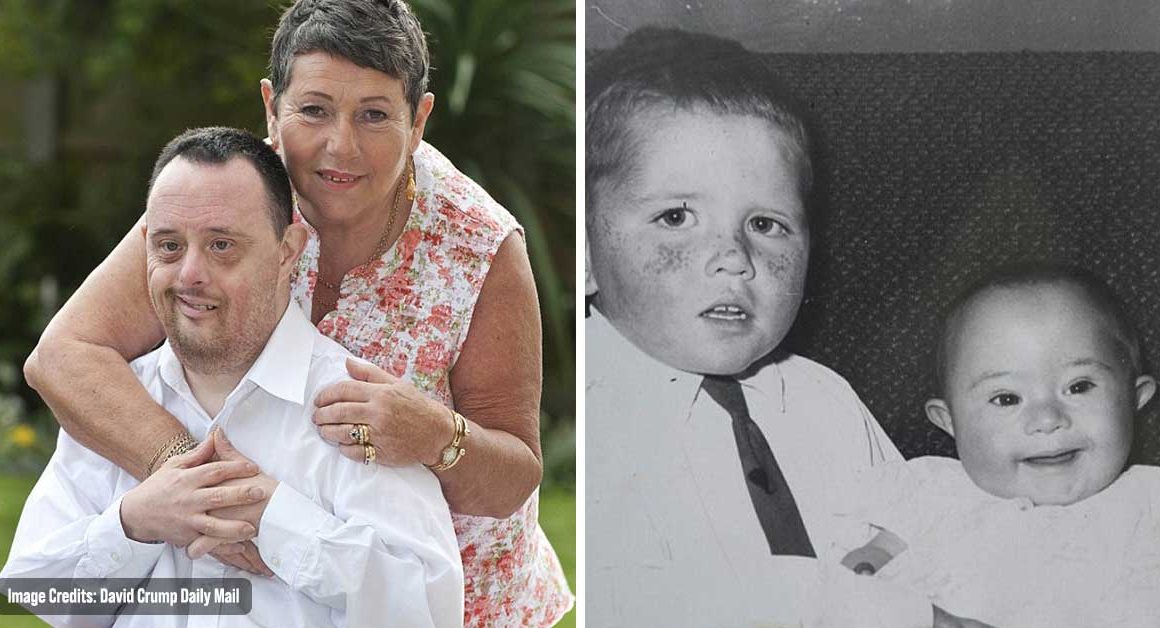Gillian Relf, a 69-year-old mother from Kent, England, told Daily Mail that after dedicating more than forty years of her life to looking after her son, who needs constant care and attention, she thinks it would’ve been better had he never been born.
Gillian, who married her childhood sweetheart Roy when she was just nineteen years old, became a first-time mother at the age of twenty when her son Andrew was born.

Gillian and Relf were living their dream life with their son Andrew when they decided to welcome another child and complete their family. So, she conceived for the second time.
However, a few months later, she felt something was wrong with the baby and the pregnancy. But the doctors and midwives assured her that everything was fine and she was being paranoid.
“There were no antenatal scans or blood tests to detect abnormalities in those days, and although I had a sixth sense, call it mother’s intuition, that there was something wrong with my baby, the doctors and midwives insisted I was being hysterical and refused to perform an amniocentesis.” She wrote.

And finally, her second baby Stephen was born in January 1967.
“The following Wednesday, I looked at him in his cot: his small, almond-shaped eyes, broad, flat nose, and the one crease on the palms of his hands.”
“He’s a Mongol, isn’t he? I gasped to my mother. It sounds shocking now, but that was how we described people with Down’s Syndrome in those days.”
“She told me she was sure he wasn’t, and it seemed everyone else was blind to what I saw so clearly. None of the doctors or health visitors even mentioned it, so for seven months, I blundered, trying to convince myself that my baby was ‘normal’”.

The following summer, her son Stephen became ill, and Gillian took him to the hospital. And after examining him, a pediatrician referred to him as a ‘Mongol baby.’
“Questions I couldn’t answer raced through my mind: Had I caused his disability? How terrible would his life be? What impact would it have on his brother Andrew, then only two? How on earth would Roy and I cope?
That was the day normal life ended for Roy, Andrew, and me.”
Gillian explained how she and her family went through many struggles after Stephen’s birth.
“In his early years, it caused me physical pain seeing friends’ toddlers reaching milestones when my son was still so baby-like. Stephen didn’t walk until he was five and couldn’t speak – even now, he has only a few words and communicates using Makaton, a sign language. This made working out his needs a constant struggle.

His incontinence meant that washing his clothes and bedding became my full-time job.” She said.
“So, exhausted and racked with guilt, I was close to the end of my tether when he became unwell shortly after Stephen’s third birthday and cried incessantly for three days and nights.”
“Worse still, he could give me no indication of what was wrong with him.” She continued. “My husband was working late shifts as a driver at the time, and by the third night, I couldn’t stand the noise any longer.”
“In a rage, I picked Stephen up, intending to throw him down our flight of stairs. Thankfully, by the time I reached the top step, I thought, ‘What on earth am I doing?’ and put him back into his cot.
“A couple of days later, I was admitted to a psychiatric hospital suffering a nervous breakdown. I was prescribed tranquilizers and then treated as a day patient for several months afterward.”
She said her marriage suffered as they were always worried and distressed because of their disabled son.
“One day, Stephen’s doctor sat us down and told us that Stephen needed an operation to remove his spleen. He said he would ‘go to sleep and never wake up without it. Those were his exact words.”
“Looking back, I believe the doctor was guiding us towards allowing our son to pass away naturally, but we didn’t understand then what he was trying to do for us.”
“I wish we had – it would have spared us all a great deal of pain. Instead, he had the operation and spent five weeks at the hospital recovering, with me at his bedside as often as possible.”
She said now Stephen lives in sheltered accommodation in Kent with 24/7 care and support.
“When we go to pick him up at the weekends, we have no idea what will happen. Sometimes he refuses to come with us; sometimes, he insists on being taken back to the home as soon as he’s had a biscuit and a drink of water or, if we’re lucky, he will be happy to stay.”
The mother of two stated that had Stephen not been born, she would have gone to have another child, and her family wouldn’t have suffered through all these years.
“I know this will shock many: this is my son, whom I’ve loved, nurtured, and defended for nearly half a century, but if I could go back in time, I would ab*rt him in an instant.”
Don’t take me wrong, but I know he would outlive us, and his brother and I become seriously upset whenever I think about his future without anyone to take care of him.” The mother concluded.
Share Your Thoughts:
What are your views about this story? Let us know in the comments.
Sources:


This must have been very difficult. Much love
I always thought that if someone has a Down syndrome baby and they were able to care for him or her then they were an extraordinary human being. In recent times I have changed my point of view and now think if I were to have a Down syndrome baby I would opt for abortion. I think the mother in this story sacrificed a lot. I can understand her feelings. I think I would’ve opted for his independent care long before she did. We had a neighbour who’s adult daughter was Down syndrome. She had the intellect of a small child. She would need care for the rest of her life.
I’ve never experienced growing up with a mentally/physically disabled sibling. And I’m also not a parent. But, I can imagine how hard it is to be the best parent possible… while your child is suffering. People want the best for their kid, but it can be difficult to do that when you don’t know how to handle the situation. Especially if there’s not a strong support system. I suppose there’s facilities that are specially trained to better help people with disabilities navigate through the daily hardships of life.
It’s extremely sad to hear such story of the pain this mother and so many other families have to go through when they have a child with disabilities and abnormalities.
I think it would be best to have an abortion then give life to a child like this as what kind of life would he or she have, clearly from this story not a good one. All the sacrifices the mother and father gave for nothing if you think about. It’s not cruel, it more humane to end it then all these lives that suffer.
As a nursing student at my University I did a home care / visiting nurse rotation where I met a 50’s year old man and his early 20’s son who was in diapers and infantile. The man’s wife had passed away a year before and he was the sole caretaker for his son. The son was totally bed bound, had to be lifted, toileted, fed and no verbal ability at all. The father’s biggest concern is who would take care of this young man if he got sick or passed away himself. This was a case to me where it would been more beneficial for all concerned to let this poor man die but in comfort.
Better to abort than put him down after years of suffering for both parents and child. Even worse to let him live out his life with no end to suffering in sight.